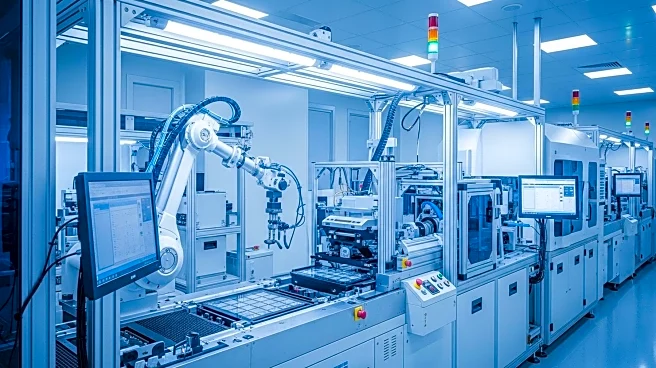What's Happening?
The U.S. government has revoked the 'validated end user' (VEU) status for Taiwan Semiconductor Manufacturing Company Limited (TSMC) at its Nanjing, China facility, effective by December 31, 2025. This decision requires U.S. suppliers to obtain individual export licenses for each shipment to TSMC's Nanjing plant, introducing potential delays in acquiring essential equipment and materials. The Nanjing facility, which contributes to 3% of TSMC's global production, primarily produces 16nm and 28nm chips for automotive, industrial, and consumer markets. The revocation could disrupt production due to delays in receiving lithography systems and chemical precursors, as Chinese suppliers currently lack the capability to replace U.S. equipment. TSMC is evaluating contingency plans to maintain operations, but the lack of a clear timeline for license approvals adds uncertainty.
Why It's Important?
The revocation of TSMC's VEU status highlights the ongoing U.S.-China tech tensions and their impact on global semiconductor supply chains. TSMC's operational challenges could lead to shifts in client demand towards Chinese foundries like SMIC and Hua Hong, potentially affecting TSMC's market share in China's foundry sector. However, TSMC's strategic investments in U.S. manufacturing, including advanced plants in Arizona, align with U.S. efforts to reduce reliance on Chinese supply chains and position TSMC to capture high-margin markets. The company's financial strength and focus on R&D for next-generation technologies provide resilience against export restrictions.
What's Next?
TSMC's future strategy involves diversifying its global footprint to mitigate risks associated with U.S. export controls. The company is expanding into Europe and the UAE to decentralize production risks and reduce reliance on any single region. Investors are closely monitoring TSMC's ability to balance short-term disruptions with long-term gains, particularly as U.S. export controls could affect its access to Chinese markets. The pace of technological advancements by Chinese foundries will also influence TSMC's competitive edge.
Beyond the Headlines
The situation underscores the broader geopolitical strategy of semiconductor companies navigating U.S.-China tensions. TSMC's alignment with U.S. manufacturing goals and its strategic global expansions reflect a trend among tech companies to diversify operations amid geopolitical uncertainties. The company's focus on R&D and innovation in advanced-node technologies positions it to adapt to evolving export control landscapes.








